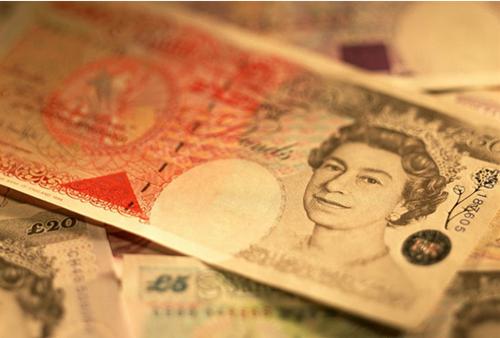Britain The public finances
英國 公共財政
Off target
偏離目標
Despite a good month, George Osborne is far from balancing the budget
縱然一月好光景,平衡收支路漫漫
January is always a bumper month for the public purse. Government receipts spike as workers scramble to meet self-assessment tax deadlines, pushing public income far above spending. The month provides a fleeting glimpse of a budget surplus, but it also, by contrast, is a striking reminder of how distant that goal remains.
對公共財政而言,一月是喜慶豐收的時刻。隨著工人們發奮實現自我評定繳稅期限,政府收入飆升,一舉帶動公共收入遠遠甩開支出。這一月間,預算出現過轉瞬即逝的盈余,但也適如其反地揭示了目標的真正實現何其遙遠。
The latest data, released by the Office for National Statistics (ONS) on 21st February, showed a January surplus of £15 billion ($23 billion). That allowed £11 billion of borrowing to be repaid, nudging public-sector debt down to £1.16 trillion or 74% of GDP. But over the course of recent years the reverse has been true: spending has been higher than receipts, meaning more borrowing and a growing pile of debt.
2月21日國家統計辦公室(ONS)公布的最新數據顯示一月盈余達到150億英鎊(230億英鎊)。這筆盈余能夠償還110億英鎊的借貸,并將公共部門債務削減到1.16萬億英鎊,即GDP的74%。但這幾年的現狀與此截然相反:入不敷出,也意味著債臺高筑。

The coalition’s austerity plan proposes to close this gap by raising income and cutting spending. Much of the early push focused on taxes: the first budget set out by George Osborne, the chancellor of the exchequer, in June 2010, included a VAT increase and higher capital gains tax. Because the tax changes were front-loaded, they are almost complete: the Institute for Fiscal Studies (IFS), a think-tank, reckons four-fifths have been made. In part, this pace was possible because the aims are modest: to raise receipts from 37% to 38% of GDP and hold them there.
聯合政府的緊縮計劃設想通過提高收入,削減支出來填補差額。計劃的初始圍繞稅收展開:財政大臣喬治奧斯本在2010年6月通過了第一批預算案,包括了更高的增值稅和資產利得稅。由于稅收變動在前期實行,他們幾乎都得以完成:一個智囊團,財政研究所認為該計劃已經完成了五分之四。某種程度上,這樣的進度是完全可行的因為目標并非遙不可及:將進款從GDP的37%增加到38%并保持在那個水準。
But even this humble target now looks tough. Income tax has brought in less than expected, as has VAT: consumer spending is held back by flatlining wages. On top of this the sale of 4G spectrum, supposed to raise £3.5 billion, netted just £2.3 billion.
但即使只是實現這個簡單可行的目標目前也看來舉步維艱。所得稅的稅額不盡如人意,增值稅亦然:消費支出因工資浮動而低迷不振。在此之上,4G頻譜的銷售只實現了23億英鎊的凈收益,而原計劃是35億英鎊。
This bad news means that a new income stream, appearing for the first time in January, is very welcome. Since March 2009 the Bank of England has been buying government debt, attempting to stimulate the economy through quantitative easing. Because its holdings are so large the interest it receives is chunky, too (by July 2012, the bank had earned £24 billion on its bond-holdings, which currently stand at £375 billion). This cash will be returned to the government, with a first payment of £3.8 billion, further boosting January’s income. Future payments will help put revenue plans back on track.
這樣的噩耗也意味著,新收益流在一月的首次出現大受歡迎。自2009年3月以來英格蘭銀行一直在購買政府債務,試圖通過量化寬松政策刺激經濟。由于占有數額龐大,利息也很可觀(截止2012年7月,銀行已經通過持有債券掙到240英鎊,而債券數額目前達到3750億歐元)。這筆現金會歸還政府,首批支付38億英鎊,進一步促進一月的收入。未來的支出會幫助收益計劃重回正軌。
But the biggest test of austerity is spending cuts. Here plans are more ambitious: the savings account for 85% of planned deficit reduction, according to the IFS. And they have only just started: only a third of cuts to benefits and a fifth of those to departmental spending will be in place by the end of the financial year. Over the next five years, reductions in benefits, investment and government consumption will deepen year on year, cumulatively cutting expenditure from 42% to 37% of GDP.
但緊縮政策的最大考驗是削減支出。相關的計劃野心勃勃:據財政研究所的數據,儲蓄要占到計劃赤字縮減的85%。而一切才剛剛起步,到財政年底之前,只有救濟金削減額的三分之一以及部門支出削減額的五分之一能就緒。在之后五年,津貼、投資及政府消費的削減會步步深入,累計將支出從GDP的42%縮減到37%。
It is early days, but the signs are not good. In December, the Office for Budget Responsibility (OBR), a fiscal watchdog, forecast that government departments would make extra cuts allowing a £4.5 billion underspend this year. But this week’s data confirm that spending on public services is actually likely to rise this year, so that forecast now looks optimistic. Overall,Britainlooks set to borrow slightly more this year than it did last year. The long road to a balanced budget is getting longer.
時候尚早,但情形并不樂觀。12月,財政監督機構英國預算責任辦公室預測今年政府部門需要進一步削減45億英鎊支出。但本周的數據證實公共服務支出可能會在今年上升,是以現在看來前景一片大好。總體上,英國今年預計貸款會比去年略多。通往平衡預算的漫漫長路變得愈發漫長。 翻譯:袁航












